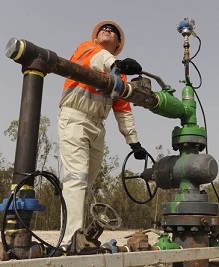Experts to weigh-in on Gloucester gas plan
 Review work will see a scientific survey of water supplies in the Gloucester region of New South Wales, with efforts to find out what impacts nearby mining operations may have.
Review work will see a scientific survey of water supplies in the Gloucester region of New South Wales, with efforts to find out what impacts nearby mining operations may have.
Scientist Kate Johnson will talk with community members in a series of meetings this month before undertaking a review ahead of the Gloucester Water Project.
Local councillor Graham Gardner says the findings will be combined with a federal bioregional assessment process, and will hopefully lead to a well-rounded picture of the impact of mining on water resources.
“The four major elements of our project which is a baseline water survey; a produced water study - evaluation study; the flood studies of the Gloucester and Avon River and then peer reviews of the work that is being done by AGL,” Cr Gardner said.
“They are the four key elements of the work that Kate will do over the next 18 months.
“Provided we ensure that the work that the Federal Government is doing is very closely integrated with the work we're doing and what the community has been looking for which is a comprehensive examination of the existing and potential impacts on the surface and groundwater of the Gloucester Valley that outcome will be available as a consequence of all this investment of time and energy.”
Dr Philip Pells, an engineer consulting with the coal industry, has criticised the Gloucester coal seam gas project.
“My biggest issue with Gloucester is we don't know. We just don't know [what the effects of the program will be],” Dr Pells said.
“I strongly believe that the way forward is for an independent ranking to be done of the prospective CSG areas in NSW, so that scientifically obviously vulnerable areas such as Sutton Forest, Gloucester, Liverpool Plains are taken out [for now], and less vulnerable areas, such as Camden, parts of the Illawarra, parts of Lithgow-to-Kandos etc are made available for detailed assessment and probable CSG production.”
“CSG should not be stopped primarily because of fracking. On the basis of my technical knowledge, the matters in order of concern are: the impact on groundwater systems and associated base-flows to creeks and rivers; produced water and what to do with the salts; damage to private land [including the rights of landowners] and fracking.”








 Print
Print